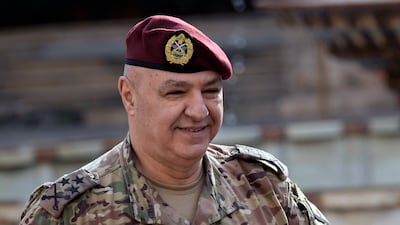Last week, the Democratic Gathering bloc in Lebanon’s Parliament, led in effect by the Druze leader Walid Joumblatt, announced it would support the candidacy of the army commander, Joseph Aoun, for Lebanon’s presidency. Several weeks ago, the Parliament Speaker, Nabih Berri, announced that the legislature would hold an electoral session on January 9 to end the 21-month vacancy in the presidency.
If Gen Aoun is elected, it would not be a surprise. From the moment the US managed to impose a ceasefire agreement in Lebanon in November, which was essentially a surrender agreement imposed on Hezbollah to end Israel’s onslaught on the country, it was evident that Washington would have a major say in the aftermath, whether the Lebanese wanted it or not. A central facet of this is the choice of a new president.
The ceasefire agreement, negotiated by US envoy Amos Hochstein, imposed an implementation mechanism for Security Council Resolution 1701, passed in 2006 to end the Hezbollah-Israel war at the time. The agreement expanded a Lebanese-UN-Israeli committee to also include the US and France, and is now led by an American general. It also gave Israel the implicit right to strike Hezbollah weapons inside Lebanon if the Lebanese army failed to disarm the party at the committee’s request.

The logical segue from this implementation structure is to ensure that the Lebanese army has the latitude to ensure compliance with Resolution 1701 and fill the vacuum that a weakened Hezbollah will leave. The best way to do so, the Americans perhaps feel, is to see to it that Gen Aoun, who is past his retirement age (but has seen his term extended twice), will remain in a position of power.
Over the years, the army has emerged as a rare outpost of normality and consensus in a deeply dysfunctional Lebanese state. Gen Aoun is one reason for this, given what appears to be his personal integrity and the fact that he is regarded as a “soldier’s soldier”.
However, it is also true that sectarian political leaders, as well as Hezbollah, are not keen to see such a figure in office. Traditionally, Lebanon’s politicians have been wary of armed forces’ commanders, principally because the latter can rely on the military, a powerful institution that can potentially counterbalance the politicians’ sway. But because the armed forces are popular, few politicians or parties openly oppose the commander.
Moreover, Gen Aoun, as a Maronite Christian, is seen as a threat by the leading Maronite-led parties, namely the Lebanese Forces and the Free Patriotic Movement. They worry that the general will be able to eat into their base of popular support. Samir Geagea, leader of the Lebanese Forces, is likely to feel somewhat less threatened than his great rival Gebran Bassil, whose political base has more organic ties to the military, and therefore is more likely to swing toward Gen Aoun.
What of Hezbollah, long seen as opposed to an Aoun presidency? It’s a sign of the party’s eroded power that it now seems more willing to accept his candidacy. Recently, a party official, Wafiq Safa, met with the commander, leading to two contradictory accounts of what came out of the meeting.
The first, apparently encouraged by the commander himself, was that the meeting went poorly, and that Gen Aoun took a hard line with Mr Safa. Certainly, the commander had a vested interest in wanting such a version to reach American ears, as this will help convince them they are making the right choice in supporting him.
A second account, spread by politicians close to parliamentary blocs opposed to Hezbollah, was that the meeting went well and that Hezbollah asked the general for a number of commitments, to which he agreed.
It’s difficult to know what really happened. However, it’s doubtful the commander, who has maintained a good relationship with Hezbollah, even as he has imposed his priorities on the party when required, had a bad meeting with Mr Safa. At a time when he needs a broad consensus to amend the constitution before his election (a requirement, as he is a serving grade-one civil servant), entering into a dispute with the party makes no sense.
Observers have suggested that the only remaining obstacle to the commander’s election is Mr Berri, who is said to oppose the move. That’s highly improbable. Mr Berri is a cunning operator and knows that if the US backs Gen Aoun, who also has good relations with Saudi Arabia, then a package deal bringing him to power will be forced on Lebanon. All the speaker wants to ensure is that he can extract promises of his own to facilitate the general’s election.
Moreover, Mr Joumblatt would never have endorsed the commander had he known Mr Berri was adamantly opposed to him. The speaker and Mr Joumblatt have long maintained strategic ties in the system, and Mr Joumblatt would not jeopardise that relationship.
It’s too early to assume that Gen Aoun’s victory is assured. There are still obstacles that need to be cleared, as all sides will want to get the most from a deal on the presidency. However, what is flagrant is that there are no other obvious candidates who have the capacity to rally a majority. Nor does it seem appropriate, in the aftermath of the recent war and the monumental regional changes in the last two months, to fall back on a weak consensus candidate who would only ensure that Lebanon’s status quo endures.


